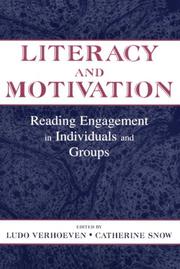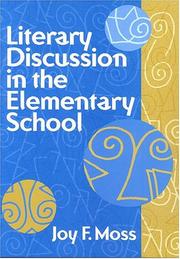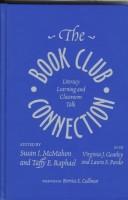| Listing 1 - 10 of 23 | << page >> |
Sort by
|
Book
ISBN: 3631452969 Year: 1993 Publisher: Frankfurt am Main Lang
Abstract | Keywords | Export | Availability | Bookmark
 Loading...
Loading...Choose an application
- Reference Manager
- EndNote
- RefWorks (Direct export to RefWorks)
Group reading --- History
Book
ISBN: 1452283842 1452279292 1452275513 9781452283845 9781452279299 9781452275512 Year: 2012 Publisher: Thousand Oaks, Calif. : Corwin Press,
Abstract | Keywords | Export | Availability | Bookmark
 Loading...
Loading...Choose an application
- Reference Manager
- EndNote
- RefWorks (Direct export to RefWorks)
Strategic grouping can transform reading instruction in the middle grades from a hit-or-miss learning experience to a targeted, responsive one. This book features a practical and field-tested model for small-group differentiated reading instruction in Grades 4-8. Jennifer Berne and Sophie C. Degener offer a clear, detailed discussion of how to position this instruction inside middle school language arts or reading classrooms and simple, effective strategies for classroom management, groupings, and assessment.
Book
ISBN: 1003840477 1032681322 1625311958 9781625311955 9781625311948 1003843433 Year: 2021 Publisher: Portsmouth, New Hampshire
Abstract | Keywords | Export | Availability | Bookmark
 Loading...
Loading...Choose an application
- Reference Manager
- EndNote
- RefWorks (Direct export to RefWorks)
"Intentional from the Start takes a concentrated look at the often-underestimated reading and writing work that goes on during the emergent reader stages of literacy development (Pre A - D) and the seemingly simplistic texts we use to teach them in small group, Guided Reading. Though both may appear unsophisticated, these earliest readers and the texts used to meet their needs are each unique and full of nuances that teachers often overlook and - worse - are rarely trained to consider"--
Book
ISBN: 3658017015 Year: 2013 Publisher: Wiesbaden : Springer VS,
Abstract | Keywords | Export | Availability | Bookmark
 Loading...
Loading...Choose an application
- Reference Manager
- EndNote
- RefWorks (Direct export to RefWorks)
Viele Jugendliche verlassen die Schule mit so geringen Lesekompetenzen, dass sie – so ist zu befürchten – nur in begrenztem Maße dazu in der Lage sind, die auf sie zukommenden beruflichen und gesellschaftlichen Anforderungen zu bewältigen. Ursula Maria Stalder verdeutlicht, dass sich die betrachteten Untergruppen (soziale Schicht, Migrationshintergrund, Geschlecht) hinsichtlich der Wirkstrukturen zur Erklärung der Lesekompetenz unterscheiden. Obwohl die Steigerung der bekannten Faktoren - wie beispielsweise der Lesemotivation - allen SchülerInnen zugutekommt, zeichnen sich dennoch deutliche Unterschiede oder unterschiedliche Gewichtungen im Hinblick auf die Förderung der Lesekompetenz ab. Die Autorin zeigt, dass die wohlgemeinte Aufforderung zum Lesen nicht nur der Motivation und dem Aufbau eines lesebezogenen Selbstkonzeptes entgegenwirkt, sondern insbesondere bei Jugendlichen aus einem sozial schwachen Milieu direkt den Aufbau der Lesekompetenz vermindert. Der Inhalt · Spannungsverhältnis zwischen Leseanforderung und Lesekompetenz · Verstehensprozesse beim Lesen · Bedeutung der Anschlusskommunikation für das Leseverstehen · Lesemotivation · Theorien der Lesekompetenz · Integration der theoretischen Ansätze in einem Prozessmodell · Gruppenspezifische Unterschiede in der Lesekompetenz, der Lesemotivation und der Anschlusskommunikation Die Zielgruppen · Dozierende und Studierende der Erziehungswissenschaften sowie der Pädagogischen Psychologie · PädagogInnen Die Autorin Ursula Maria Stalder ist wissenschaftliche Mitarbeiterin des Instituts für Erziehungs- und Kulturwissenschaften an der Universität Osnabrück.
Social sciences. --- Social Sciences, general. --- Group reading.
Book
ISBN: 1492642231 149264224X Year: 2016 Publisher: Naperville, Illinois : Sourcebooks,
Abstract | Keywords | Export | Availability | Bookmark
 Loading...
Loading...Choose an application
- Reference Manager
- EndNote
- RefWorks (Direct export to RefWorks)
Best books --- Group reading --- Book clubs (Discussion groups)

ISBN: 0805831932 0805831940 Year: 2001 Publisher: Mahwah, N.J. Erlbaum
Abstract | Keywords | Export | Availability | Bookmark
 Loading...
Loading...Choose an application
- Reference Manager
- EndNote
- RefWorks (Direct export to RefWorks)
Sociolinguistics --- Sociology of literature --- leesgedrag --- leesopvoeding --- Group reading. --- Literacy. --- Reading --- Social aspects.

ISBN: 0814129633 Year: 2002 Publisher: Urbana (Ill.) : National council of teachers of English,
Abstract | Keywords | Export | Availability | Bookmark
 Loading...
Loading...Choose an application
- Reference Manager
- EndNote
- RefWorks (Direct export to RefWorks)
Children --- Group reading. --- Lerarenopleiding --- Literature --- Books and reading. --- (vak)didactiek talen. --- Study and teaching (Elementary).
Book
ISBN: 9781138086067 Year: 2017 Publisher: London : Routledge,
Abstract | Keywords | Export | Availability | Bookmark
 Loading...
Loading...Choose an application
- Reference Manager
- EndNote
- RefWorks (Direct export to RefWorks)
Book clubs (Discussion groups). --- Books and reading --- Discourse analysis. --- Group reading. --- Sociological aspects.

ISBN: 0807736147 Year: 1997 Publisher: Newark International reading association
Abstract | Keywords | Export | Availability | Bookmark
 Loading...
Loading...Choose an application
- Reference Manager
- EndNote
- RefWorks (Direct export to RefWorks)
Action research in education --- Book clubs (Discussion groups) --- Group reading --- Reading (Elementary)
Book
ISBN: 1472570243 1474295436 1472570235 9781472570239 1472570227 9781472570222 9781472570246 9781472570222 9781350045538 1350045535 9781474295437 Year: 2016 Publisher: London
Abstract | Keywords | Export | Availability | Bookmark
 Loading...
Loading...Choose an application
- Reference Manager
- EndNote
- RefWorks (Direct export to RefWorks)
"Over the last two decades, reading groups have become increasingly popular in the UK and the USA. More and more people seem to be interested in sharing their reading experiences and hearing other readers discuss their views on books, whether this is online, through the mass media, or in face-to-face contexts. In light of this explosion in popularity of reading groups, this ethnographic study focuses on several reading groups based across a variety of settings: public libraries, public houses and in readers' homes. A range of methods are used to investigate the practices of the individual readers and the groups, including participant observation, interviews, and audio-recordings of meetings. Reading groups are found to be highly ritualized and potentially competitive places in which matters of identity and taste are often at stake. The groups studied are conceptualized as communities of practice, and the literary interpretations and evaluations offered within each group are shown to be a product of shared norms established by this group."--Bloomsbury Publishing.
Book clubs (Discussion groups) --- Reading --- Language arts --- Elocution --- Book clubs --- Book discussion groups --- Book study groups --- Clubs --- Group reading --- Social aspects. --- Study and teaching --- Group reading. --- Reading circles --- Reading groups
| Listing 1 - 10 of 23 | << page >> |
Sort by
|

 Search
Search Feedback
Feedback About UniCat
About UniCat  Help
Help News
News